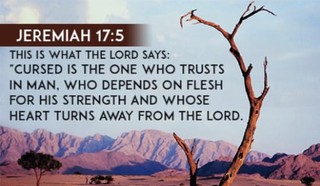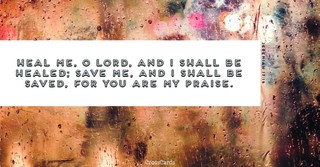
- Recent Translations
- All Translations
Jeremías 17:1
Share
Settings
Jeremías 17:1 Meaning and Commentary
The sin of Judah is written with a pen of iron
Or an iron tool, such as engravers use in working on hard matter: [and] with the point of a diamond;
such as glaziers use in cutting their glass; though this is not the word used for a diamond in ( Exodus 28:18 ) , this word is elsewhere translated an adamant, ( Ezekiel 3:9 ) ( Zechariah 7:12 ) . Bothart F8 takes it to be the smiris, which jewellers use in polishing their gems. Jarchi makes mention of a Midrash, or exposition, which explains the iron pen of Jeremiah, and the point of the adamant, or diamond, of Ezekiel, because of what is said of them, ( Jeremiah 1:18 ) ( Ezekiel 3:9 ) . Kimchi thinks the word "shamir", rendered "diamond", is expressive of the subject matter on which their sin is said to be written, and not of the instrument with which; and then it is to be read thus,
``the sin of Judah is written with an iron pen (with an iron claw, or nail, of which mention is made in some Jewish writings) upon "shamir", or an adamant stone;''which is no other than their stony heart, as it follows: it is graven upon the table of their heart;
where it is so fixed that it cannot be rooted out, and will never be forgotten by them, but always remembered and desired; for which they have the strongest affections, having a place, and having made deep impressions there: or this may denote the evidence of it in their own consciences, which bore witness to it, and which they could not deny: and upon the horns of your altars;
on which the names of their idols were engraven or inscribed, ( Acts 17:23 ) , so that their idolatry was notorious; their consciences within, and their altars without, were testimonies of it and besides, the blood of the sacrifices was poured upon the horns of the altar, ( Leviticus 4:7 ) and which, as it was done at the offering of sacrifices appointed of God, so very probably at the offering of sacrifices to idols, and which made their sin notorious; yea, even all the sacrifices of the ceremonial law were a standing testimony of their being sinners, and carried in them a confession of sin, and that they were deserving of death, and so were a handwriting against them; for there is no need to limit the sin of Judah here to idolatry, but it may include all their sins; and so the Targum expresses it in the plural number,
``the sins of Judah;''though, if any particular sin is intended, it seems to be idolatry, by what follows.
F8 Hierozoic. par. 2. l. 6. c. 11, col. 842. of which stone, see Dioseorides, Hesychius, & Stephanus in ib.
